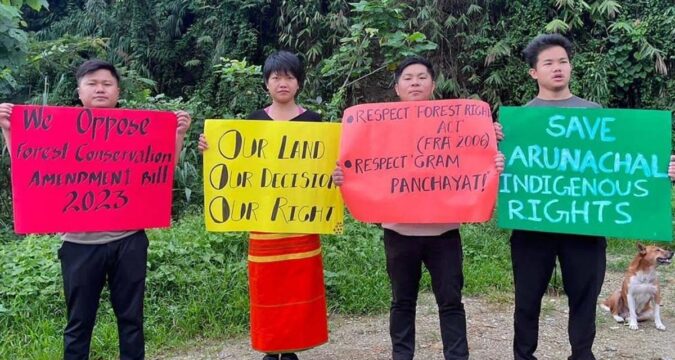
INDIA GREENS PARTY
Issued at iGP NHO at Greendham Anandi-Chait, Unchir-Dunktok, Pauri Garhwal, Uttarakhand on 23 August 2023.
Press Release
The India Greens Party today opposed the reclassification of forest areas; exemptions for projects near border areas and for security purposes; exemptions for zoos, safari parks and ecotourism activities; and disempowering local communities as proposed in the Forest Conservation (Amendment) Bill, 2023.
The party is of the opinion that a provision allowing the central government to exempt clearance for “any other purposes”, could have disastrous consequences, as this could open the door to a whole host of activities on forest land that will no longer require clearances.
In view this, the party today petitioned the Prime Minister Narendra Modi to take into consideration the suggestions made by the political parties and the NGOs with regard to the Forest Conservation (Amendment) Bill, 2023, and make necessary changes in it before passing the same in the Rajya Sabha as well.
The Bill was introduced in the Lok Sabha in March this year, is now awaiting debate in the Rajya Sabha after having been passed by the Lok Sabha with almost no debate in June this year (2023). The Bill was referred to a Joint Parliamentary Committee (JPC) comprising 32 members from both Houses of Parliament and across party lines.
However, the Bill broadly seeks (a) to restrict the conservation scope of the Act to only certain forest lands; (b) to exempt border lands from the obligation to seek permissions to clear forests in order to construct “strategic linear projects of national importance”; and (c) to allow some non-forest activities on forest lands, like running zoos and ‘eco-tourism’ facilities.
It is regrettable that the Bill was not referred to the relevant Parliamentary Standing Committee, which in this case would have been the Standing Committee on Science and Technology, Environment, Forests and Climate Change, headed by Congress MP Jairam Ramesh. Also, the JPC did not propose a single change to the Bill in its report despite receiving around 1,200 representations – including objections from tribal groups, conservationists, environmental lawyers, activists, and citizen groups.
Six members of the JPC itself wrote dissent notes. The Ministry of Tribal Affairs also raised concerns with the JPC about the amendment’s implications on community rights enshrined in the Forest Rights Act 2006.
Not only this, the Bill got a free pass in the Lok Sabha as most Opposition MPs were focused on highlighting the violence in Manipur. It was set to be debated in the upper house at the time this article went to press. Debate or no, the Bill’s drastic break from the longstanding legal definition of ‘forests’, its focus on creating carbon sinks (instead of the Act’s aim to conserve existing forests), and the uncertainty over its coverage don’t bode well.
The party regrets that the thrust of the Bill is on redefining what a ‘forest’ is in Indian law. It stipulates that only those lands that were notified as ‘forest’ under the Indian Forest Act 1927, any other relevant law or were recorded as ‘forests’ in government records will be acknowledged as ‘forests’ under the Act as well.
The party is of the view that this revision stands in stark contrast to the wide applicability of the extant Act at present – i.e., it applies to “any forest land”. A Supreme Court judgement in 1996 had reiterated such a broad application. It said, inter alia, that a ‘forest’ includes all land recorded as such in government records regardless of ownership as well as “deemed forests”, which are not officially classified as ‘forests’ but satisfy the dictionary meaning of the word: any large area with significant tree cover and undergrowth.
The areas that stand to be affected in a significant way include about 40% of the Aravalli range and 95% of the Niyamgiri hill range; the latter is home to the Dongria Kondh, a Particularly Vulnerable Tribal Group. Many experts are also uncertain, and thus apprehensive, about the actual extent of land that will fall outside the purview of the amended Act considering the State-wise data of deemed forests is not publicly available.
It is also regrettable that the Bill seeks to exempt linear infrastructure projects – like roads and highways – from seeking forest clearance permissions if they are located within 100 km of the national border. Experts have raised concerns because “strategic linear projects of national importance” is an undefined term and can thus be misused to push through infrastructure projects that are devastating for the local ecology. This is of particular concern in the Northeastern States, where the exemption would apply de facto almost across the region.
Instead, the Government of India should aim to establish science-based and world-class conservation centres away from forested sites. While eco-tourism can be an important ancillary activity to generate employment, it is not correct to exempt it from clearances as it indicates that tourism will take priority over nature. In many cases, ecotourism projects have resulted in large-scale construction, which has negatively impacted natural ecosystems.
–Issued by the iGP Chief Spokesperson Suresh Nautiyal.
Material sourced from:
- www.indiagreensparty.org/
- www.google.com/
- www.thehindu.com/sci-tech/energy-and-environment/explained-what-will-the-amended-forest-conservation-act-change/article67146543
- www.indianexpress.com/article/opinion/columns/ravi-chellam-writes-why-protecting-indias-forests-should-be-a-part-of-national-security-8857475/
————————————————
(India Greens Party is registered with the Election Commission of India under Section 29A of the Representation of the People Act, 1951. Registration Number: 56/476/2018-19/PPS-I, effective from 18/07/2019.)
National Head Office: GreenDham AnandiChait, IndraBalbhadra Parisar, Unchir-Dunktok, SH-31, PO-Ghurdauri, Distt-Pauri Garhwal, Uttarakhand, INDIA. PIN-246194.
Email: contact@indiagreensparty.org Website: https://indiagreensparty.org




You must be logged in to post a comment.